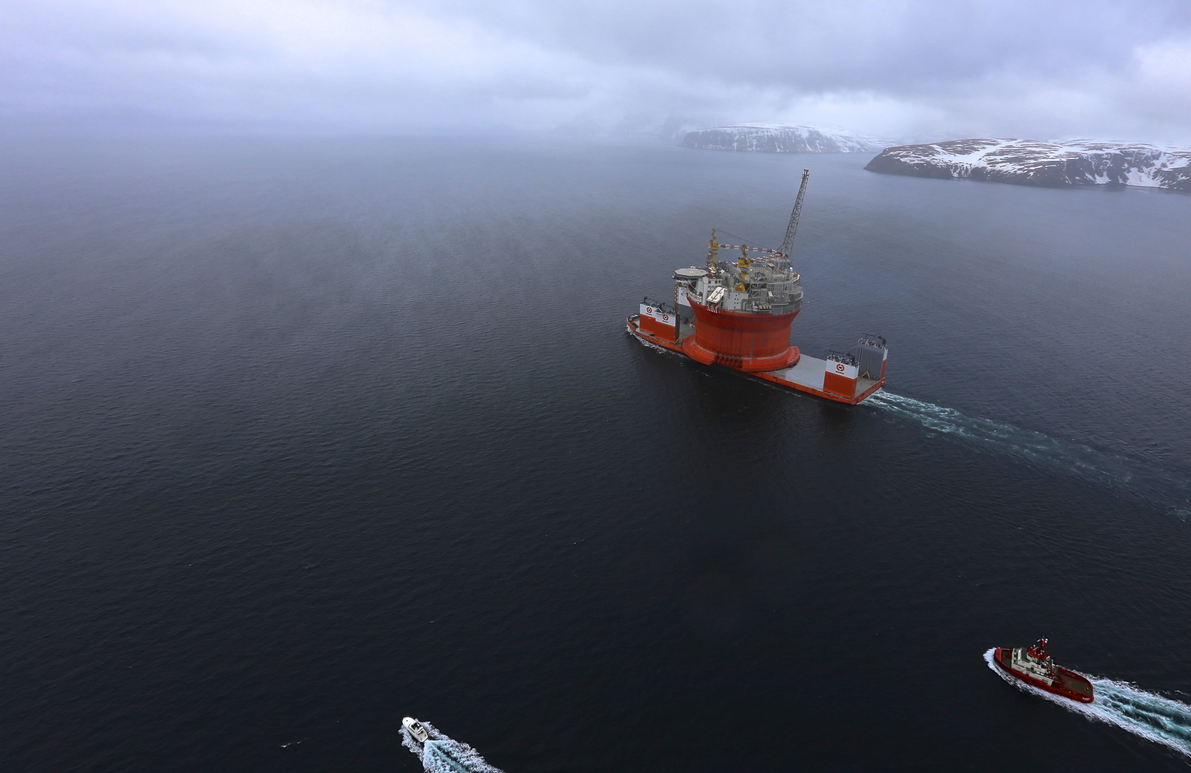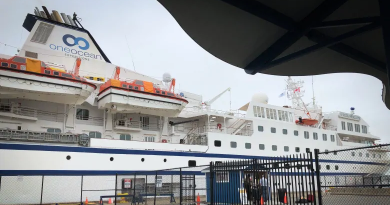Blog: Goliat arrives in Hammerfest, poised to open new frontier in Arctic offshore oil

April 17 was a historic day for humanity on the earth’s final and last frontiers.
As the International Space Station berthed SpaceX’s Dragon this morning while floating above earth, hours earlier on the planet’s northern edge, Dockwise Vanguard arrived in Hammerfest, Norway. The celestial venture marks a milestone for public-private endeavors in space, while the Arctic venture marks a milestone for international collaboration within the sovereign space of Norway’s continental shelf.
Onboard Dockwise Vanguard, the world’s largest float-on/float-off ship – so big it could carry the Chrysler Building – is a floating production, storage, and offloading vessel (FPSO), built a hemisphere away in the Hyundai shipyard in South Korea. Once the FPSO, owned by Italian multinational oil and gas company Eni, moves into position in the Barents Sea, it will begin extracting oil from the world’s northernmost offshore field. The license for the field, also called Goliat, is 65% owned by Eni Norge and 35% by Statoil. This field is even farther north than the Prirazlomnoye field in Russia’s Pechora Sea, the first (and only other active) offshore oil field north of the Arctic Circle. Prirazlomnoye was the site of a heated encounter between Greenpeace, Gazprom, and the Russian Coast Guard. Greenpeace’s boarding of the rig resulted in the arrest and imprisonment of 28 activists and two journalists, which I discussed at length in a previous blog post.
It doesn’t seem that Goliat, however, has generated as much controversy, and I’m not sure why. Perhaps there is some sense of resignation: once the barrier of Arctic offshore oil was broken with the Russian project, turning back the tide of development may seem impossible. Yet some politicians are speaking out against Goliat. Kari Elisabeth Kaski, party secretary of of Norway’s Socialist-Left (Sosialistisk Venstreparti), declared:
“The Goliat project marks the start, but also the end, of oil operations in the Barents Sea. This is an oil field and an oil platform that are spun off from scandals.” (source: NRK, in Norwegian).
The Goliat field is estimated to hold 174 million barrels of oil. The Prirazlomnoye field, by contrast, is said to contain 610 million barrels. The Russian project is much more statist and domestically-oriented in nature than the transnational Goliat project, which involves Italian, Korean, and Norwegian companies, to name a few. Indeed, parallels could be drawn with the globalized story of MV Nunavik, the Japanese-built ship that is extracting nickel and copper concentrates from a Chinese-owned mine in northern Quebec. In contrast, Prirazlomnaya is a project as domestic as they come in this day and age. The platform was built in a Severodinsk shipyard, while Russian-built ships are transporting the oil from the Arctic offshore field to more southern destinations.
Redefining the limits
Dockwise Vanguard – a ship described to be “redefining the limits of exceptional marine heavy transport” – represents more than just an extension of human activity northward into the Arctic frontier. It also demonstrates the increasing scale of Arctic projects. The ship and its precious cargo – the Goliat FPSO platform – are together so large that they could not have sailed from the South Korean shipyard that built Goliat through the Northern Sea Route to Hammerfest even had it been summer, when the ice would have retreated from the Russian shipping passage. Even more mind bogglingly, the enormous ship could not even use the conventional shortcuts of either the Panama or Suez Canal due to size restrictions. Instead, the vessel had to sail 15,608 nautical miles for 63 days all the way from South Korea, around Southeast Asia and across the Indian Ocean, around the Cape of Good Hope in South Africa, and up across the North Atlantic to northern Norway.
This is just one of many voyages Dockwise Vanguard has made since 2012 transporting offshore production platforms, often built in the Far East, to distant sites of oil and gas exploration, from the Gulf of Mexico to the Arctic. The current voyage to Norway may seem very long, but the vessel can travel faster than previous ships of its ilk. This is especially important for companies who wish to extract resources at the height of a commodities boom. As an article from E&P Magazine describes, “Such a reduction in sailing time has many benefits, but the most obvious one, perhaps, is that it enables fields to be brought onstream and begin earning revenue much earlier than previously possible.” Despite Dockwise Vanguard’s speed, however, it couldn’t make up for the delays that occurred during the FPSO’s construction. These delays will cost Eni Norge and Statoil, who had wished to begin production in 2014, when oil prices were significantly higher. The breakeven price of Goliat’s production is reportedly around $95. Given today’s price of $63 for Brent crude oil, Eni Norge and Statoil may have missed their chance, at least for a while, for fat profits (although today’s price marks a 9.7% jump for the week).
Italy: Driving the next frontier
Dockwise Vanguard’s voyage to Hammerfest, its most northern journey ever, epitomizes the reach of humans and their financial and technological instruments into ever more complex and distant frontiers. A massive amount of multinational collaboration by companies in countries with advanced engineering and shipping sectors, in addition to the friendly regulatory environment in Norway, has enabled the opening of the Arctic offshore frontier in the Norwegian Arctic.
Yet it could also be argued that Italy, the country that gave birth to the seminal explorer, Christopher Columbus, has driven the opening of frontiers in both space and the Arctic on this historic day. The case is pretty clear in Norway, where Eni Norge is the majority owner of the Goliat field. Yet in outer space, SpaceX’s Dragon delivered some very important cargo, too: the “ISSpresso,” an Italian espresso machine described by Forbes as a “joint venture of Italian aerospace company Argotec and Italian coffee maker Lavazza.” Astronauts can now drink hot coffee instead of a powdery mix. Without coffee – or, it seems, Italian ingenuity – how would oil companies and space companies be able to boldly go where none have gone before?
External links
Eni Norge press release of the ship’s arrival into Hammerfest (in Norwegian)
NRK has a video of the ship’s arrival into Hammerfest.
You can see the ship’s location on VesselFinder.
This post first appeared on Cryopolitics, an Arctic News and Analysis blog.
Related stories from around the North:
Canada: Appeal to start on Arctic seismic testing, Radio Canada International
Finland: Finns still sharply divided over wind power, Yle News
Greenland: Arctic oil and gas must stay in ground to restrict warming to 2°C says study, Blog by Mia Bennett
Iceland: From Arctic Circle 2013-2014, a big drop in the price of oil, Blog by Mia Bennett
Norway: Oil, Industry and Arctic Sustainability, Deutsche Welle’s Ice-Blogger
Russia: Russian drillship returns to Arctic, Barents Observer
Sweden: Lower electricity bills for Swedes, Radio Sweden
Russia: Barents regional governors wants better Northern Sea Route, Barents Observer
United States: With new purchase, Shell may be less keen on Arctic, Alaska Public Radio Network



